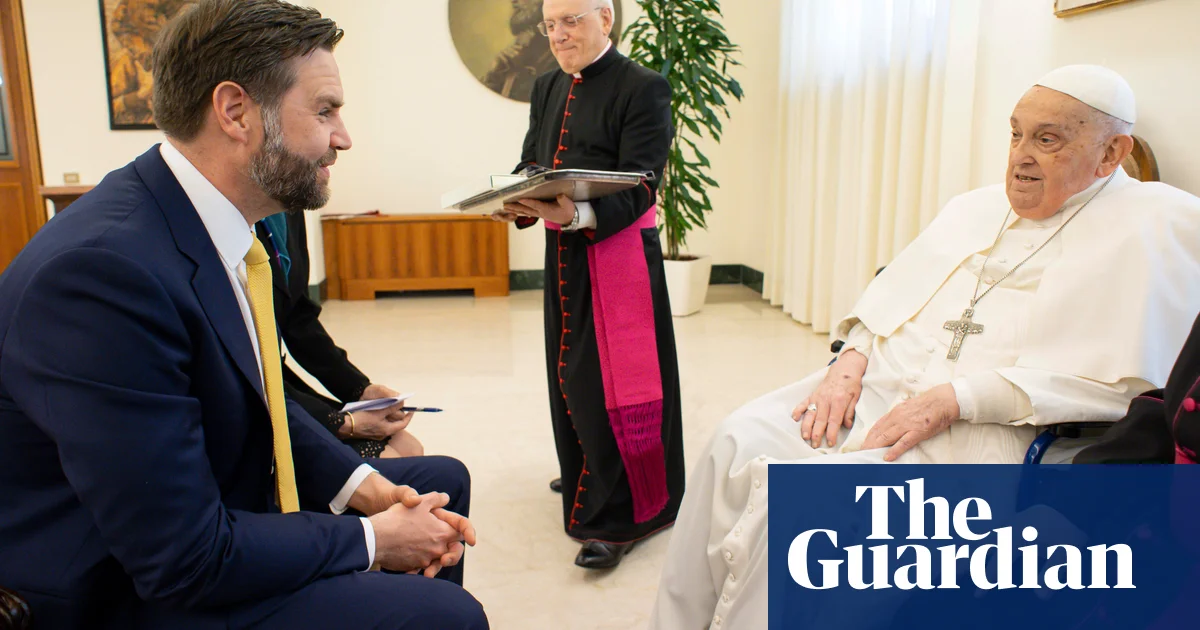Not long before what would turn out to be his final public appearance, a blessing of the crowds who had gathered for Easter Sunday mass in St Peter’s Square and an unexpected popemobile tour of the piazza, Pope Francis received a devout if perhaps unlikely visitor.
Among the last people to see and speak to the pontiff in the hours before his death early on Monday morning was the US vice-president, JD Vance, a zealous, albeit comparatively recent, convert to Roman Catholicism.
The pair met on Sunday morning at the Domus Santa Marta guest house, the down-to-earth lodgings where Francis lived during his 12-year papacy. According to statements from the Vatican and Vance’s office, the two men spoke for a few minutes to exchange Easter greetings, and the 88-year-old pope gave the vice-president rosaries, a Vatican tie and three big chocolate Easter eggs, one for each of his children.
Despite Vance’s much-touted faith, the encounter was one that few in Washington or Rome would have predicted. He and Francis had had deep and public disagreements in recent months over the Trump administration’s attitudes to immigration, not least its mass deportation efforts.
In a letter to Catholic bishops in the US in February, the leader of the world’s 1.4 billion Roman Catholics described the mass deportations as a “major crisis” that was damaging “the dignity of many men and women”.
Francis acknowledged the right of a country to keep its communities safe from people who had committed violent or serious crimes, but said: “What is built on the basis of force, and not on the truth about the equal dignity of every human being, begins badly and will end badly.”
For a US administration that prides itself on plain speaking, the bishop of Rome’s thoughts could not have been more plainly spoken.
Francis also sought to rebut Vance’s claims that the US government’s actions were justified by a concept from medieval Catholic theology known as ordo amoris, or rightly ordered love. The vice-president had invoked the concept to suggest there was a clear hierarchy of care, and that compassion should be focused on one’s community and fellow citizens before it was extended to the rest of the world.
“Christian love is not a concentric expansion of interests that little by little extend to other persons and groups,” the pope pointed out in his letter to the bishops. “The true ordo amoris that must be promoted is that which we discover by meditating constantly on the parable of the Good Samaritan, that is, by meditating on the love that builds a fraternity open to all, without exception.”
Vance acknowledged the pontiff’s criticism, but said he would continue to defend his views. He did not address the issue specifically during an appearance at the national Catholic prayer breakfast in Washington DC in February, but called himself a “baby Catholic” and acknowledged there were “things about the faith that I don’t know”.
It was not the first time that Francis had openly criticised Trump’s policies. During a visit to Mexico in February 2016, nine months before the election that gave Trump his first term, the pontiff offered a blunt response to the business magnate’s plans for a border wall between the US and its southern neighbour.
“A person who thinks only about building walls, wherever they may be, and not of building bridges, is not Christian,” he said. “This is not the gospel.”
Trump was stung. “For a religious leader to question a person’s faith is disgraceful,” he said in response. “No leader, especially a religious leader, has the right to question another man’s religion or faith.”
The day before he met the pope, Trump’s No 2 had sat down with the Vatican’s secretary of state, Cardinal Pietro Parolin, and its foreign minister, the archbishop Paul Gallagher.
The Vatican said the talks had been cordial, but it noted that there had been “an exchange of opinions on the international situation, especially regarding countries affected by war, political tensions and difficult humanitarian situations, with particular attention to migrants, refugees, and prisoners”.
For all their past disagreements, one of Francis’s final visitors was among the first to offer his condolences on the pope’s death.
“I just learned of the passing of Pope Francis,” Vance posted on X on Monday. “My heart goes out to the millions of Christians all over the world who loved him. I was happy to see him yesterday, though he was obviously very ill. But I’ll always remember him for the below homily he gave in the very early days of Covid. It was really quite beautiful. May God rest his soul.”
The contents of Sunday morning’s meeting between the two men are unlikely ever to be divulged, but in Francis’s final Urbi et Orbi message, which was read out on his behalf at mass in St Peter’s Square on Sunday, the Jesuit pope issued a familiar and characteristic appeal for kindness and empathy.
“How much contempt is stirred up at times towards the vulnerable, the marginalised, and migrants,” he said. “On this day, I would like all of us to hope anew and to revive our trust in others, including those who are different than ourselves, or who come from distant lands, bringing unfamiliar customs, ways of life and ideas. For all of us are children of God.”
